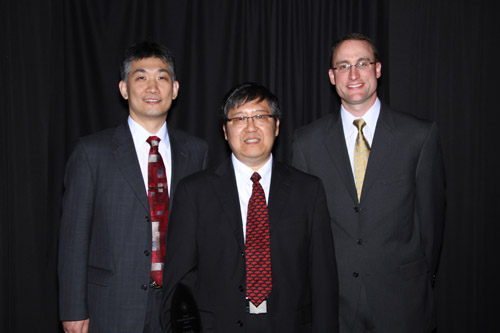
Three College of Engineering faculty members received awards during the college's annual banquet on Saturday, April 5, at the Springdale Holiday Inn and Convention Center. The John L. Imhoff award was established in 2004 by John Imhoff, former head and founder of the industrial engineering department, to recognize faculty members who have excelled in research and teaching in the College of Engineering.
Douglas Spearot, associate professor and holder of Twenty First Century Professorship in Mechanical Engineering received the John L. Imhoff Award for Outstanding Teacher. Jia Di, associate professor of computer science and computer engineering, and Shui-Qing “Fisher” Yu, assistant professor of electrical engineering, each received the John L. Imhoff Award for Outstanding Researcher.
Spearot received a bachelor’s degree in mechanical engineering from the University of Michigan. He completed his master’s degree and doctorate in mechanical engineering at the Georgia Institute of Technology. Spearot teaches a broad range of mechanical engineering classes, from Introduction to Materials to graduate courses covering computational modeling and advanced numerical methods. As a teacher, Spearot has developed new advanced courses and successfully integrated mentoring, research and teaching in his classes. His students have consistently given him excellent teaching evaluations. He has mentored 11 graduate students and acts as a faculty mentor for Material Advantage, a registered student organization. He was been named Outstanding Researcher by the department of mechanical engineering in 2012 and Outstanding Teacher in 2013.
In 2007, Spearot received the Ralph E. Power Junior Faculty Enhancement Award to support his study of plasticity in nanostructured materials. In 2010, he was awarded a National Science Foundation CAREER Award to elucidate the nanoscale mechanisms associated with phase selected during vapor deposition. In 2012, he received a Young Leader International Scholar Award from the Minerals, Metals and Materials Society.
Di completed his bachelor’s and master’s degrees in at Tsinghua University, and earned a doctorate in electrical and computer engineering from the University of Central Florida, Orlando. He joined the computer science and computer engineering department as an assistant professor in August 2004.
Di’s research focuses on delay-insensitive asynchronous digital integrated circuit design. Although this IC design technology was invented in the 1950s, it has not become widely used by the semiconductor industry because of the lack of applications that demonstrate its benefits and minimize its drawbacks. After years of exploration, Di has successfully identified a number of applications for which asynchronous logic has significant advantages over the prevailing synchronous solutions, and he has developed several innovations in asynchronous circuit design for each application. These applications include circuits designed for ultra-low power, extreme temperature, intense radiation, secure hardware, and process/voltage/temperature variability tolerance.
Di’s research innovations have drawn strong interest from a variety of government agencies and industry organizations. His efforts have led to twenty-nine externally funded research projects during the past nine years. His projects include fundamental research funded by the NSF and NASA, transferrable technologies funded by industry, and national security related innovations supported by the Department of Defense. In addition to research grants, Di’s reputation in his field has brought him several valuable academic collaborations, and he works closely with industry partners. These grants and collaborations also benefit students. During the past nine years, Di’s TruLogic Lab had has over 30 graduate students and ten undergraduates working on various research projects.
Yu received his bachelor’s and master’s degrees in electronics from Peking University and his doctorate in electrical engineering from Arizona State University in 2005. He spent one year as a postdoctoral research associate in ASU’s MBE Optoelectronic Group and then joined ASU’s Center for Nanophotonics as an assistant research professor.
Yu joined the U of A electrical engineering department as an assistant professor in fall 2008. His research interests are developing novel semiconductor optoelectronic devices such as lasers, photo detectors, THz devices, and renewable energy devices covering visible to far-infrared wavelength ranges by using novel Bismide compounds and SiGeSn alloys and advanced nanofabrication techniques. Yu has published 44 articles in refereed journals and 102 articles and abstracts in conference proceedings in the areas of semiconductor optoelectronic device modeling, fabrication and characterization. He has also contributed 126 presentations and 19 invited talks at conferences and workshops.
Yu won the Palais Outstanding Doctoral Student Award in 2005 from the ASU Electrical Engineering Department, selected out of 41 Ph.D students that graduated in 2005, and the IEEE Phoenix Society Chapter award in 2008 for technical contributions. Yu received an Outstanding Researcher award from the U of A College of Engineering in 2011, and the William D. Brown and Margaret A. Brown Faculty Excellence Award from the U of A department of electrical engineering in 2013.
In 2012, Yu received a prestigious CAREER award from the National Science Foundation. This grant supports his research in bismuth, a relatively unexplored element that could be used in semiconductors and optoelectronics. Yu is a member of the International Society for Optical Engineering and the Institute of Electrical and Electronics Engineers.
Contacts
Camilla Medders, director of communications
College of Engineering
479-575-5697,